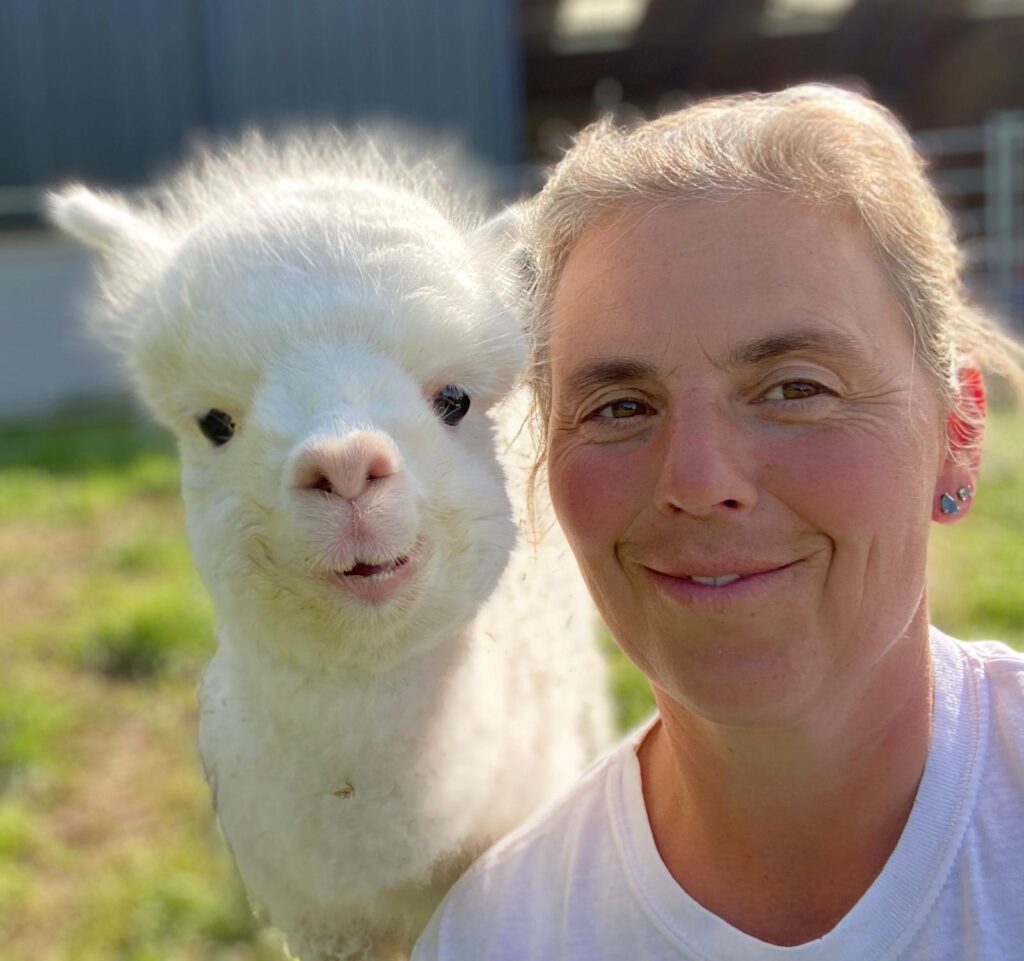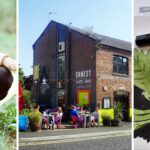- Work Hard
- 21st Jul 2021
- 2.1k Views
- 0
- 7 minutes
Sunday-sit down with…Debbie Rippon, Barnarce Alpacas

We caught up with Debbie to chat about what made her ‘paca bags to move up North and pursue her dream, why she’s dedicated her life to over 300 alpacas and what a typical day looks like for her…
Life’s a weird and wonderful ride that takes us on a journey, leaving us not knowing what’s around the corner. But life’s too short not to follow our dreams – and Debbie Rippon is a fine example of a woman who’s living her best life.
While working a stressful office job as an insurance broker in Northamptonshire, Debbie always dreamed of living a peaceful life in the country. But it was when she watched Michael Palin visit a subsistence farmer in Peru on TV that she realised her dream could become a reality. Realising she was captivated by the alpacas she saw alongside the Monty Python star, Debbie began researching.
Before she knew it, her husband Paul ‘accidentally’ got a job running a farm in Northumberland. Soon after, Debbie quit her job and the pair didn’t hesitate to pack their bags and follow their alpaca dream.
Now Barnarce Alpacas is home to a herd of over 300 alpacas, and Debbie’s so proud that she had the guts to follow her dream. We caught up with her to chat about how her life has changed, the reality of looking after that many animals and discover a few fun facts about her herd – did you guys know what alpacas can pause their pregnancy?! Mind. Blown.
What made you want to quit your office job to set up an alpaca farm?
The main reason why I quit my job to pursue my alpaca dream was my dad. He and my mum had always planned to travel around the UK in their caravan once he retired, but sadly he became ill, could no longer drive and died far too young, so never got to do it. This made me realise that life really is too short.
We bought what I termed at the time our ‘forever home’ in Northamptonshire, with some land for the alpacas – we had four pet alpacas – but three months in, Paul accepted a job up North. So I quit my office job to get breeding alpacas and make a business from them. To be honest, at that point (18 years ago), I wasn’t sure how I was going to do that!
How did you adapt to farming life?
Paul and I are not from a farming background. I had quite a well-paid office job working relatively long hours and traveling, but now I work much harder and longer hours than I ever did in the office! Our farm is our home, business and passion all rolled into one.
Initially, it was very strange, not having a regular wage and not really knowing what I was doing! I helped a local sheep farmer to get a bit of hands-on experience; studying courses and reading is good, but there’s nothing quite like actually doing it – whether that’s delivering a baby or injecting the medicine.
I’ve never been one to stay in bed or sit watching the television, so the early starts and hard graft weren’t a problem. Plus, there was no longer a need to go to the gym!
We love alpacas, so we can totally see the appeal! But why have you chosen to dedicate your life to them?
It wasn’t really the plan when we started out, to have the number that we do. In my head, I think I thought between 20 and 30 would be great, but they just have the ability to get under your skin. They’re so gentle and it’s so rewarding seeing the trust they have in us. Now we have just over 300! They’re addictive!
Tell us about your work at Barnarce Alpacas.
Paul and I now work together with the alpacas and farming jobs, which usually works well. I love working with the animals and Paul loves anything that involves using one of his tractors. We care for the alpacas’ day-to-day needs alone and we have a great alpaca vet if we need him. We also have a professional alpaca shearer, who comes once a year.
What does a typical day look like for you?
It’s currently birthing season, so that means early starts – usually about 5am. I’ll start by checking in on the pregnant girls and see if anyone is looking like they may give birth that day. We have a couple of cria (baby alpaca) who’re being topped up with a bottle, so they get their first bottle then too.
Then it’s breakfast time for all the animals. They get fed and checked before we begin paddock cleaning. We then do our alpaca walk and talks, deal with any births (we have 70 babies due). We’re currently making about 20 tonnes of hay, skirting fleece to be turned into yarn, and dealing with our holiday cottages – so life is pretty hectic!
Everyone then gets an evening feed, so that’s another chance to check them all over and deal with anything that may arise.
Can you tell us about some of the characters in your herd?
Every single one of our alpacas have names and we know them all. There are lots of characters and some very special ones, too many to mention really.
Ziyad is very special. He was born in the placenta and was starved of oxygen, so is slightly brain damaged. But he is doing fine and loves people – he’s a firm favourite with our Twitter and Instagram friends and walk and talk visitors! Hughie was our second ever baby, he’s 14 now. Many years ago, he was attacked by a dog and got bitten 13 times. Since then, he thinks he needs to protect me.
Czaravena is an older girl who is absolutely bonkers! We’ve never managed to get her pregnant, despite buying her as a breeding female. She clearly doesn’t like her name, because every time you say it she throws her nose in the air and blows air in your face!
Tell us a fun fact about alpacas, that not everyone knows?
Alpaca can pause their pregnancy if they want to! No one knows exactly why, they think it’s stress or lack of food. They also only like to birth when the weather is good so they will hang on if the weather is bad.
What products can you make using alpacas’ wool?
We only use the best of individual alpaca fleeces for knitwear, so you can buy a hat, gloves, scarf or baby booties from Jasper, for instance. We also make felted jewelry from the less fine fleece and use the lower quality fleeces for things like nesting material.
What are your plans for the future?
To carry on doing what we do and sharing the alpaca love with others!
To find out more about Barnacre Alpacas and to book your next walk with Ziyad, Czaravena and the gang, visit their website, or keep up to date with all of the gos on the farm via their Instagram










Comments